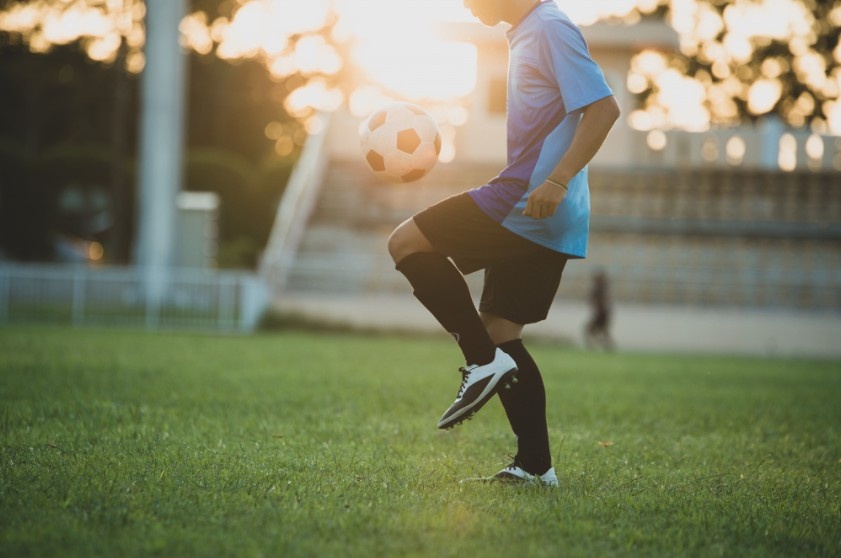I’ll admit it. Growing up, soccer wasn’t my first love. I was the kid who got picked last for teams, barely able to keep up with the fast-paced action of the game. But over the years, I fell in love with soccer—not just as a spectator, but as a player.
What started as a frustrating hobby quickly turned into a passion. And through all the late-night practices and countless hours of watching professional games, I learned a lot about improving my skills.
If you’ve ever found yourself frustrated after a match, wishing you were a better player, you’re not alone. I was there once too. The good news? Getting better at soccer is totally possible, and it’s a journey that anyone can embark on—whether you’re just starting or looking to refine your game. Here’s how you can level up your soccer skills, no matter where you’re starting from.
Why Is It Important to Improve Your Soccer Skills?
Soccer is more than just kicking a ball. It’s about precision, endurance, teamwork, and mental toughness. Improving your soccer skills not only makes you a better player on the field but also boosts your confidence and helps you understand the dynamics of the game.
Whether you want to play at a higher level, improve your fitness, or just have more fun with friends, the benefits of improving your soccer skills extend beyond the field. So, how do you get better at soccer?

How Can I Improve My Soccer Skills?
Improving your skills in soccer involves a combination of training, technique, and mindset. Let’s break down some practical steps you can take to get better at the game.
1. Master the Basics
Before you can become a star player, you need to master the basics. Here are a few key fundamentals that every soccer player needs to know:
- Passing and Receiving: Work on both short and long passes. A good first touch when receiving a pass is just as important as the pass itself. Practice controlling the ball, using both feet and different parts of your foot (inside, outside, and instep).
- Dribbling: Dribbling can make or break a play. Practice close control, using small touches to maneuver the ball, and learn how to change direction quickly. Mastering both your weak and strong foot will give you an edge in the game.
- Shooting: The ability to shoot accurately and powerfully is crucial. Whether it’s a volley, a low shot, or a free kick, spend time working on your shooting technique. Remember, placement often beats power.
2. Work on Your Fitness
Soccer is a physically demanding sport, so improving your fitness is essential. Here’s how you can get in shape for soccer:
- Endurance: Soccer requires stamina because you’re running constantly. Long-distance running or interval training (alternating sprints and jogging) will help build your endurance. Try running 3-4 times a week to build up your cardiovascular capacity.
- Strength Training: While soccer isn’t as physically demanding as contact sports, you still need strong legs, core, and upper body to perform well. Squats, lunges, and core exercises like planks will help you maintain balance and agility on the field.
- Agility and Speed: Soccer players need quick bursts of speed. Speed drills like shuttle runs or cone drills can help improve your agility and quickness. Work on your acceleration and deceleration to help you change direction fast during a game.
3. Improve Your Soccer IQ
Knowing what to do with the ball is one thing, but knowing when to do it is another. Understanding the game and your position is just as important as being technically skilled. Here’s how to improve your soccer IQ:
- Watch Professional Matches: Observe the movement of professional players, especially those in your position. Pay attention to how they make decisions on the ball, how they position themselves, and how they anticipate plays.
- Learn the Tactics: Study formations, offensive and defensive strategies, and how to read the game. The more you understand the flow of the game, the better you’ll be at making smart decisions on the field. Talk to your coach or teammates about different plays and formations to broaden your understanding.
- Practice Vision: As you play, constantly look for space and teammates. Anticipate passes and runs, and think about your next move before receiving the ball. Building this awareness will make you feel more in control.

How to Practice Soccer Alone
You don’t always need a team to improve your skills. Many aspects of soccer can be practiced alone. Here are a few drills you can do on your own:
- Wall Passing: Find a wall or a rebounder and practice passing the ball back and forth. Work on different angles, using both feet, and varying the intensity of the pass.
- Dribbling Drills: Set up cones or markers in a straight line or zigzag pattern and practice dribbling through them. Time yourself to improve your speed and control.
- Shooting Against a Target: If you have access to a goal or a wall, practice shooting at specific targets like the top corners or low corners. Work on shooting with both feet and from different angles.
How Can I Stay Motivated to Improve My Soccer Skills?
Staying motivated during your training is key to getting better. Here’s how you can maintain motivation:
- Set Small, Achievable Goals: Start with smaller goals (e.g., improve your passing accuracy or dribble for 10 minutes without losing control) and gradually increase the difficulty as you progress.
- Track Your Progress: Keep a journal or use a fitness app to track your progress. You’ll feel more motivated when you see your improvement over time.
- Get a Training Buddy: Having someone to train with can keep you motivated and make the process more fun. You can challenge each other and improve together.

FAQs On Soccer Practice
1. How long does it take to improve your soccer skills?
Improving your soccer skills depends on your current level and how much time you dedicate to practice. With consistent practice, you can start seeing improvements in a few weeks. Mastering more advanced techniques may take a few months or longer.
2. What should I eat to improve my soccer performance?
A well-balanced diet is key for performance. Focus on complex carbohydrates (like whole grains and fruits), lean proteins (such as chicken, fish, or tofu), and healthy fats (like avocados and nuts). Staying hydrated is equally important, so drink plenty of water during training.
3. Is it okay to practice soccer every day?
While it’s great to be dedicated, it’s important to avoid burnout and injuries. Practicing soccer 4-5 days a week, with rest days in between, will allow you to improve without overstraining your body.
4. What is the best way to improve my soccer passing?
To improve your passing, practice with both feet, focus on precision, and try passing at different distances. Using a wall or a rebounder can help you improve accuracy and timing. Aim to pass with purpose, ensuring that your passes reach teammates with the right weight and direction.
The Final Whistle: Keep Improving and Enjoy the Game!
Getting better at soccer takes time, patience, and dedication. It’s about mastering the basics, building on them, and consistently pushing yourself to improve. With hard work, you’ll notice improvements in your game that will make you a more confident and skilled player.
Remember, soccer is not just about individual performance—it’s about being part of a team, enjoying the game, and continually learning. Whether you’re aiming for a professional career or just having fun with friends, keep training, stay motivated, and embrace the journey to becoming a better player.
The field is waiting for you—now go out and give it your best shot!





